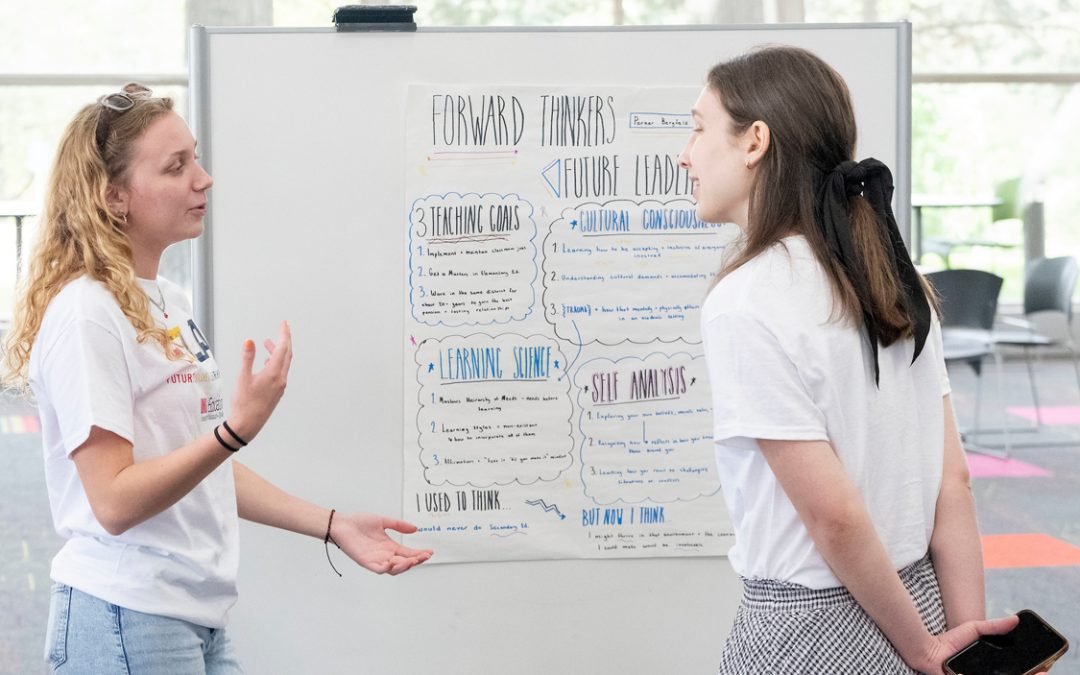
UMSL faculty members (from left) Sandra Langeslag, Lauren Obermark and Jennifer Siciliani lent their expertise to discussions ranging from effective breakup coping mechanisms to reclaiming the concept of “rhetoric” to the psychological underpinnings of selfies during radio show appearances last week. (Langeslag photo by August Jennewein; Obermark and Siciliani photos by Evie Hemphill/St. Louis Public Radio)
In the lead-up to Valentine’s Day, the El Paso Zoo came up with a novel idea.
For a small fee, it offered the lovelorn a chance to name a cockroach after their ex and watch it get fed, live on webcam, to the zoo’s meerkats on Valentine’s Day.
A fun promotion, sure. But, as University of Missouri–St. Louis Assistant Professor of Psychology Sandra Langeslag told National Public Radio’s “All Things Considered” on Feb. 8, it’s probably not the best way to get over a particularly devastating breakup.
“Distraction is also helpful to feel less unpleasant,” Langeslag told NPR, summarizing research into breakups that she published last May. “So just think about unrelated things that don’t have to do with your ex.”
Langeslag was one of three UMSL researchers who had a chance to showcase her expertise on the radio recently. Assistant Professor of English Lauren Obermark and Teaching Professor of Psychology Jennifer Siciliani appeared on the St. Louis Public Radio | 90.7 KWMU show “St. Louis on the Air” on consecutive days. Obermark was a guest on the Feb. 11 edition, discussing modern understandings of the meaning of the term “rhetoric,” and Siciliani followed on Feb. 12 for a show centered on selfies and the new downtown St. Louis attraction The Selfie Room.
Siciliani said she could see the communal experience of a trip to The Selfie Room, which houses different backdrops and settings against which people can snap selfies, as fulfilling its patrons’ needs.
“Resarch shows there are six reasons people do anything of this sort: environmental enhancement, boosting self-confidence, attention-seeking behavior, mood modification, an attempt to engage in social competition and subjective conformity,” said Siciliani, who appeared on the show with host Don Marsh, Saint Louis University Associate Professor of Communication Amber Hinsley and Erika Klotz, the co-owner of The Selfie Room. “Group selfies encompass all six of those needs that selfies fill.”
The body of research regarding selfies is fairly young, Siciliani said, but she cited studies determining how documenting moments through selfies lessens a person’s ability to enjoy a situation and at what frequency selfie taking becomes a problem.
“If you take three or less a day but don’t necessarily post, you’re OK,” Siciliani said. “If you take three and do post, you’re getting into the zone of possibly having a problem. Then six or more that are posted per day is considered, by these authors anyway, as pathological.
“Some research points out the fact that artists have always done self-portraits. This is just the modern version of those things. Is it linked to narcissism? Several studies suggest that, in men, it is. In women, it’s not, yet we see more selfies taken and posted by women than we do men.”
Obermark also commented on the role social media has played in shaping modern attitudes during her “St. Louis on the Air” appearance. She and Saint Louis University Associate Professor of English Paul Lynch discussed interpretations and definitions of rhetoric – the art of persuasion in communication.
It’s a concept that has been studied since ancient times, when Greek philosopher Plato, for instance, saw it as a negative.
“A lot of times we go with Aristotle’s definition of rhetoric as all the available means of persuasion, but really he was talking about oratory and men doing great speeches,” Obermark said. “Rhetoric has never been just celebrated by everyone. People were always worried about it. Plato was so worried about people writing down their speeches because he thought it was going to destroy our memories. We see these concerns every era emerge in different ways, the way we’re worried about texting now destroying the English language.”
In modern times, “rhetoric” has almost become shorthand for empty political messages meant to sway the populace toward the politician’s viewpoint. But Obermark thinks that is a simplistic understanding of the concept.
“I want to frame it first as being about civic engagement,” Obermark said. “It’s how we engage as citizens with each other, how we listen to each other, how we speak to and about one another. That’s how I want to reclaim rhetoric. We always want to keep that close to our hearts.”














